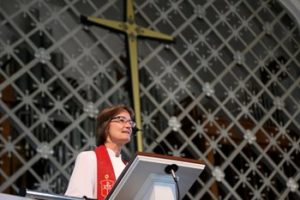Today I participated in a Press Conference to announce Sunday September 13 as a Day of Hope – the beginning of a substance abuse initiative that seeks to reduce the incidence of substance abuse in West Virginia. The Day of Hope and recovery materials will be distributed by mail from the Council of Churches and in an electronic format. Keep your eyes and ears open for these materials and the listening events and action plans that will follow this Day of Hope. I now share my press conference statement.
West Virginia Council of Churches
Proclaiming a Day of Hope: Celebrating Prevention and Recovery
Press Conference Statement: July 28, 2015
In 1992, the United Methodist Church issued a Pastoral Letter entitled, “God’s Face is Turned Toward the Mountains: A Pastoral Letter of Hope.” This letter we hear the call for the Church in Appalachia to be incarnational, that is, to be present with those who are our neighbors, whoever and wherever they may be.
The Pastoral Letter also calls us to ask the following questions:
“Who is sick? Why are they sick?
Who is hungry? Why are they hungry?
Who is homeless? Why are they homeless?
Who are the victims? Why are they victims?”
Furthermore, the letter states: “We will be for them. We will speak for them. We will be on their side – on the side of the victims.”
To do this, to be “on the side of the victims,” the Church must enter into the communities and the places where persons and their families are suffering from substance abuse in all its many forms. Sometimes that ministry will take place in among church families who are caught in the web of despair. Other times, the Church will be called out into the community. Wherever this ministry takes place, we need to remember that no one is immune from this epidemic. It is time that we erase the stigma of substance abuse, both from our congregations and our communities. The Day of Hope, to be recognized on September 13 in all our congregations, is a beginning. September 13, a Day of Hope, is a beginning, but not the end of this process for the West Virginia Council of Churches.
Following the Day of Hope, the West Virginia Council of Churches hopes to hold a series of listening events across the state engaging sectors, such as medical, corrections, and economic circles , and faith communities in geographic locations in order to hear firsthand what is happening with both substance abuse and prevention in our churches and our local communities. This follow up action to follow the Day of Hope is in the planning stage.
But listening must lead to action. We must find ways to build the capacity of our congregations. Accurate information is needed and evidence-based approaches are called for. In addition to the Day of Hope, the Council of Churches is exploring avenues to train both clergy and laity with the skills they need to confront substance abuse in their churches and local communities.
We must connect. The faith community is generally considered a great ally to prevention, but often finds itself disconnected from initiatives occurring on the ground. We must help community and faith efforts to find one another in order to respond with strength greater than either would have alone. Faith communities bring a number of resources to the table, including the ability to educate congregations and communities; the opportunity to reach children and youth with prevention strategies and intervention; the presence to provide support to those in treatment or in recovery; and to provide support to families dealing with addiction.
We must care for those in our midst who are trapped by substance abuse. Matthew 25 has always been a cornerstone of the Church’s teaching about compassion. The questions of “When did we see thee hungry, thirsty, sick, naked, or in prison,” are as relevant today as they were 2,000 years ago. Through these questions, we are reminded that Christ is found in everyone who suffers.
In the end, it must be with compassion and determination that we confront the issue of substance abuse within our churches, our communities, and among our friends and families. We will stand with those in need, whoever they may be, whether family, friends, neighbors, or strangers, so that they may know that they do not stand alone. Thank You!

Sandra Steiner Ball, Resident Bishop
The West Virginia Conference of the United Methodist Church